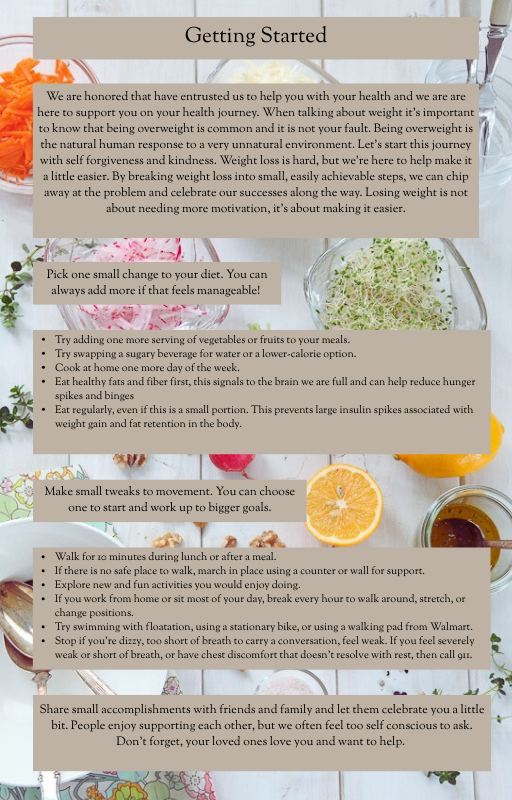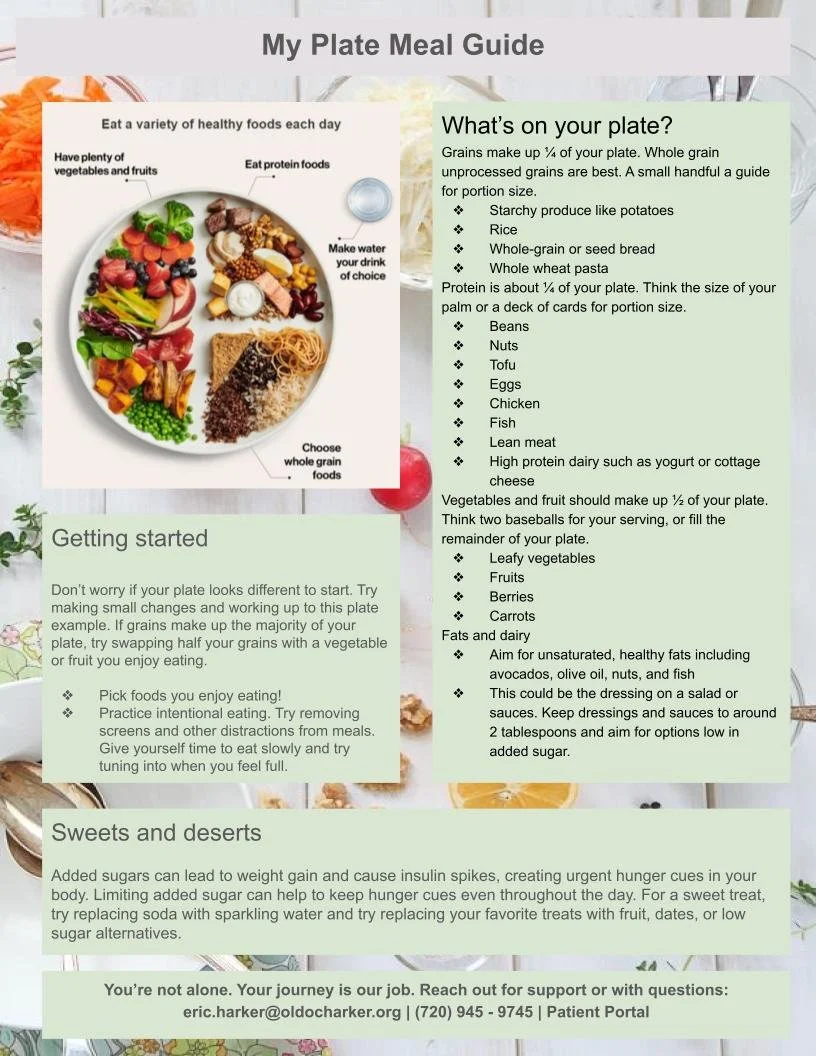Weight management materials
Obesity and diabetes are overwhelmingly common, with 73% of Americans being obese or overweight. While common, being overweight causes stress to the body and its systems, increasing the risk of chronic disease. Something I have seen over the course of my time practicing medicine is a dismissal of preventative care. Instead of working to promote health and prevent chronic illness, many Americans live with their health untreated, eventually leading to progressive states of illness that are more difficult to treat and manage. Promoting healthy living early on helps to reduce conditions that are exacerbated by weight and reduce the risk of chronic illness. One of my goals as a provider is to help my patients achieve the highest quality of life possible, and making weight management comprehensible is one of my top priorities. Being overweight is normal, and we have to create better ways of navigating weightloss that are not overly complex.
When talking about weight, it’s important to know that being overweight is common, and it is not your fault. How can it be that being overweight is now normal? Being overweight is the natural human response to a very unnatural environment. We are bombarded with advertising and surrounded by highly processed, hyperpalatable (unnaturally tasty) foods that are addictive. We live in environments where it is difficult, or even unsafe, to be active. Most of us overuse, and many of us are addicted to, video screens, including phones, tablets, computers, and televisions, both at work and at home. And our generations have been born with a genetic tendency to become overweight. It is not your fault. The journey to weight loss starts with kindness and forgiveness towards ourselves.
Weight loss is hard, but we're here to help make it a little easier. By breaking weight loss into small, easily achievable steps, we can chip away at the problem and celebrate our successes along the way. Losing weight is not about needing more motivation; it's about making it easier. Celebrating success builds confidence, which leads to success, which builds confidence, and the cycle of success repeats.
Living in the current day and age is difficult with constant information available at any given time. It is especially difficult to know what information to trust and how to navigate information from so many sources. Health information should be free, straightforward, and accessible to all. Weight loss, healthy living, and making healthy choices can be difficult. The following are resources and information that are evidence-based and doctor-recommended to help guide health.
Starting a weight loss journey is difficult. Your health behaviors don’t have to perfect, starting is enough. Aim for one or two small wins a day.
Changing eating habits can be difficult and making it a habit takes time. When starting your weight loss journey, forgetting to exercise and occasional binges are normal, don’t get discouraged and always celebrate your successes. My plate is a great way to visualize nutrition.
Even 20 minutes a day of activity offers huge benefits to mental health, mood, and reduces the risk of heart disease.
My Journey to human touch Health
It all begins with an idea.
My interest in healthcare began as child and has culminated in my desire to open my own practice in Lyons, Colorado. My father died when I was eight years old, from lung cancer, and my mother became functionally disabled soon after. My brother, mother and I moved in with my grandparents, seeking a safe and stable home. But my grandma had rapidly progressive Parkinson’s disease and she needed help to get around the house, to dress, bath, and eventually to eat. She showed me what it was like to suffer but she also showed me courage, strength, kindness, patience, tenacity, empathy and love. She and her caregivers taught me the importance and reward of being of service to another person and the importance of being able to live at home and be with family. I learned that I wanted to help people.
I studied medicine at Duke University, one of the best medical schools in the world, and I studied public health at the University of North Carolina in Chapel Hill, the second ranked program in the US. I did primary care internal medicine residency training at the University of Colorado in Denver, which is one of the top programs for primary care internal medicine. I learned a great deal about medicine, but I also learned about many of the things that are terribly broken with the US healthcare system.
After residency I practiced primary care medicine at Kaiser Permanente in Colorado. In addition to caring for my patients I helped lead our local clinic in Boulder, then helped manage the north region of KP Colorado, then preventive medicine for all of Colorado and developed some of the first and best prevention programs nationally for KP. I finally retired from Kaiser in 2018 to help launch innovative models of primary care for Iora (later acquired by One Medical) and specialty heart and lung care for NuvoAir Medical.
Even in some of the best health systems in the world I saw people neglected, disrespected, and left behind because of a lack of insurance, lack of social support, and lack of family or community support. Diagnosing illness and coming up with the right treatments turn out to be easier than navigating the healthcare system and social supports to get people what they really need, which is often time and attention from someone who cares, listens, and sticks around when things get difficult. You can get some of the best technology, tests, and treatments if you have good insurance and plenty of money. But it’s hard to find someone who will treat you with kindness and patience, taking the time to learn what you care about and how you wish to receive care.
In the summer of 2025 I launched Human Touch Health with the goal of providing personalized medical care to people in the Lyons area and via telemedicine to people across the country. Combining 20 years of experience with the human qualities I learned from my grandmother, patients I’ve cared for, and professionals I’ve worked with, I seek to provide care, empathy, careful listening, and medical skills in order to improve peoples’ lives.



